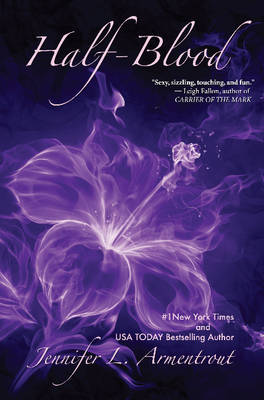Reviewed by rakesandrogues on
While HALF-BLOOD really entertained me, it’s far from perfect. I guess I can’t help but find some faults in a book and nitpick. I felt like the climax of the book was really rushed. What was hours for Alex only translated to a couple of paragraphs and it made me feel disconnected from her as a reader. Because her struggles were written in a matter of paragraphs, the intensity of her pain and suffering were diluted to me as a reader.
However, I loved that this book had a beginning, middle, and an end – despite the fact that it is a first in a series. The ending was enough to leave me satisfied as a reader, but there were also enough loose ends to make me crave the next book. Yes, I can’t wait!
I think what kept me from fully enjoying HALF-BLOOD is the fact that now I really can’t help but compare it to Richelle Mead’s Vampire Academy series. When I heard that HALF-BLOOD was Vampire Academy meets Percy Jackson, I didn’t believe it until I actually started reading. There are just so many elements in the book that reminded me of Vampire Academy, and at first, it wasn’t a good thing. I’d hate to say the P-word so I’d rather not, but the fact that the beginning of HALF-BLOOD was so similar to the beginning of Vampire Academy bothered me. I was even tempted to pull out a copy of Vampire Academy and do a line-by-line analysis. (Okay, I didn’t end up actually doing this, and I’m not making any accusations. But yes, the beginning of HALF-BLOOD felt like ad lib.)
But of course I can’t forget the fact that this is a different magic system altogether. What makes HALF-BLOOD stand out against the recent surge of popular Greek mythology-based YA novels is the fact that this novel isn’t based on one certain myth. Armentrout takes the idea of demi-gods and their offspring and creates a fascinating world complete with a caste system. While I wish that it could have actually incorporated a bit more mythology into the novel, it was also refreshing that the storyline wasn’t following one of the Greek myths. In the end, I love that Armentrout did something different with Greek mythology than all the others in the market.
I have to keep reminding myself that is a different book altogether, and I should stop thinking that Rose or Dimitri wouldn’t act a certain way in Scene A or B because they don’t exist in HALF-BLOOD. Alex and Aiden are both kick-ass characters that deserve my respect and admiration.
But, oh my gods, this is a four-star review, so what is up with all the complaining? Okay, I can’t help but point out the obvious similarities with Vampire Academy but I should not let this stop my from actually praising Half-Blood. From the very beginning, I knew I would love this.
Aiden really is swoon-worthy and Alex is so so lucky. I’m a sucker for forbidden love – done right, mind you – and Armentrout really knew how to build up the tension between Alex and Aiden. Aiden had been easily inducted into my Epic List of Hot Book Boyfriends (a mental list – this doesn’t really exist anywhere else but my head). Silver eyes are a definite plus, and I love that he’s all broody and mysterious. And super hot and muscular. Okay, he reminds me a lot of Dimitri Belikov, minus the Russian part. I wish that the romantic tension would have been drawn out even more. Even though it was great seeing some progress between Aiden and Alex, I felt that it would have been more satisfying if less had happened between the two of them and the tension was left unresolved until the sequel.
I love the world building in HALF-BLOOD. I really learned about the different caste systems of the pures and halfs, and I love the dynamics between them all. They create some interesting conflicts in the novel, so the focus just isn’t on romance. Thank gods.
I feel like I complained more than praised in this review, but don’t get me wrong: this is a must-read. Don’t discriminate HALF-BLOOD because it’s published by an indie. This is a gem and Spencer Hill Press is so lucky to have found it.
Reading updates
- Started reading
- 22 August, 2011: Finished reading
- 22 August, 2011: Reviewed
